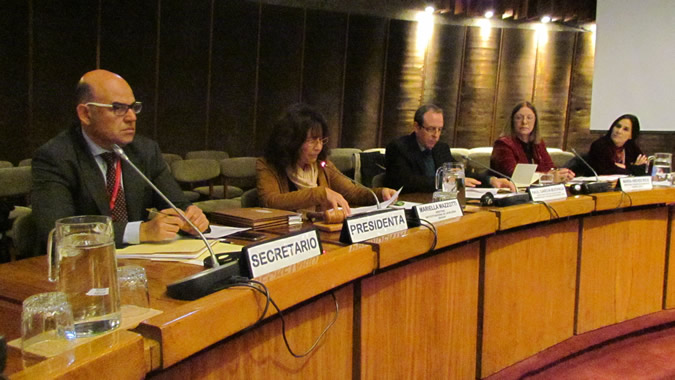Press Release
Ministers and senior officials from mechanisms for women’s advancement in the region are participating this Thursday and Friday, May 25-26, in the fifty-fifth meeting of the Presiding Officers of the Regional Conference on Women in Latin America and the Caribbean to review implementation of the Montevideo Strategy, approved in October 2016 to achieve gender equality, rights guarantees and women’s autonomy.
The gathering was inaugurated by Mariella Mazzotti, Director of the National Women’s Institute (Inmujeres) of Uruguay – in that country’s capacity as Chair of the Presiding Officers of the Regional Conference on Women – and Raúl García-Buchaca, Deputy Executive Secretary for Management and Programme Analysis of the Economic Commission for Latin America and the Caribbean (ECLAC), in representation of Executive Secretary Alicia Bárcena.
In her speech, Mazzotti asked that attendees not forget the uncertainty the region currently faces regarding the future of some of its democracies, or the context of economic stagnation. “Democracy is a key element for life and for exercising the rights of women,” she said, adding that they “must play an active role in its preservation and in the articulation of gender equality policies with development policies.”
“We will not take any steps backward on the gender equality gains we have made,” the Director of Inmujeres emphasized.
Meanwhile, Raúl García-Buchaca highlighted that “in these seven months since the XIII Regional Conference on Women in Latin America and the Caribbean in Uruguay, different countries have made efforts to strengthen their policies for gender equality and women’s autonomy by setting in motion the Montevideo Strategy,” a political-technical instrument of a regional nature that can be adapted to national and subnational priorities.
The Strategy includes 10 pillars for implementation and 74 measures for developing equality policies that are transformative and innovative.
García-Buchaca made special reference to the relationship between the Regional Gender Agenda – forged over the 40 years during which the regional conferences on women have been held – and the 2030 Agenda for Sustainable Development and its 17 Sustainable Development Goals (SDGs), approved by all the countries of the United Nations in 2015.
“From our regional perspective, all of the targets of the 2030 Agenda’s SDGs are, to a greater or lesser extent, linked to the achievement of gender equality and women’s rights,” the senior ECLAC official indicated. To that end, the organization’s Division for Gender Affairs has formulated a proposal to mainstream gender in the SDGs and their targets.
During the meeting, ministers will be able to access diverse documents that can contribute to the implementation of the Montevideo Strategy, including the study Gender equality plans in Latin America and the Caribbean: Road maps for development, prepared by ECLAC’s Gender Equality Observatory for Latin America and the Caribbean.
Currently, 22 countries in the region have gender equality plans (17 in Latin America and 5 in the Caribbean), while 15 countries have national development plans that contain gender-related objectives or strategies.
On Friday, a panel will be held on technical-professional education and its link to young women’s labor insertion in Latin America and the Caribbean. There, three other ECLAC publications will be presented that can help to achieve SDGs 4 (quality education), 5 (gender equality) and 8 (decent work and economic growth), to name just a few.
More information
- Full document Gender equality plans in Latin America and the Caribbean: Road maps for development.
- Note for Equality N° 24: Planning for equality and women's autonomy.
For queries, contact ECLAC’s Public Information Unit.
Email: prensa@cepal.org; Telephone: (56 2) 2210 2040.
Follow us on: Twitter, Facebook, Flickr, YouTube and Google+.



